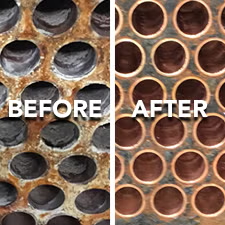Water Treatment, Limescale, and Your Facility
Why is water treatment important?
Water treatment in commercial facilities is crucial for maintaining the overall health and efficiency of water-operated equipment. However, even with a water treatment program, there is the potential for limescale (calcium carbonate) buildup and the increased costs that scale fouling can generate. Industrial descaling solutions can quickly remove limescale buildup and the associated issues through a quick and effective Clean-In-Place (CIP) circulation.
What is Limescale and how is it removed?
Limescale is a hard, chalky deposit that can form inside any piece of equipment utilizing water as a heating or cooling medium. Scale can form on any type of surface, drastically affecting equipment efficiency. These deposits are created when preexisting mineral compounds in the water fall out of suspension and plate onto surfaces. Limescale buildup, especially on heat transfer surfaces, can cause several problems, including reduced water flow, increased energy costs, and shortened life expectancy of capital equipment. An effective means of removing limescale fouling is with an industrial descaling solution. Typical chemical scale removal methods in a descaling job use strong acids like phosphoric, citric, sulfamic or hydrochloric acids. More advanced formulas provide a blended finished descaling solution that includes wetting and penetrating agents, corrosion inhibitors, and other additives to make sure the base acids remove the scale but do not damage equipment alloys. Specific formulas exist for different applications or metals, like copper, stainless steel, and more.
How does water treatment prevent scale buildup?
One of the most significant challenges of water treatment programs is keeping scale and minerals suspended, and once they begin to adhere to surfaces (and they typically do), operational problems begin. One of the biggest downsides to limescale buildup is the increased costs that it can drive. Limescale can cause a decrease in the operating efficiency of equipment dependent on water, leading to higher energy costs. Commercial and industrial systems using water as a heat exchange medium are particularly susceptible to scale due to the heat or thermal flux within the equipment. These include industrial equipment such as chiller tubes, boiler tubes, heat exchangers, and cooling towers. Additionally, the buildup can cause damage to equipment, which can be costly to repair or replace. Water treatment programs are not always perfect and commercial facilities may need to invest in supplemental strategies such as industrial descaling solutions to combat limescale accumulations.
Despite various challenges, water treatment has many benefits in commercial facilities. For example, it can help to minimize scale accumulations, prevent the growth of bacteria and other harmful organisms, and it can help to improve the overall quality of the water. Additionally, water treatment can help to reduce the number of pollutants in the water and can help to conserve resources by reducing the amount of water that is used.
Next Steps
Water treatment in commercial facilities is an essential aspect of maintaining a business’s overall health and efficiency. While there are many benefits to water treatment, there are also some downsides that should be considered, such as the potential for limescale buildup resulting in increased costs. To ensure that the water treatment process is effective and efficient, it is crucial to invest in a chemical descaling preventive maintenance program, including industrial descaling solutions to regularly mitigate limescale buildup. Contact our experts to make sure you are using the right industrial descaling solution for the job.


